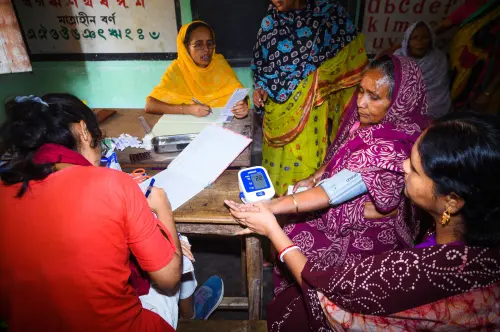Last October, 200 students from Colombia’s Servicio Nacional de Aprendizaje (SENA) worked the floor of the campus coliseum at Universidad del Norte in Barranquilla. They were among 900 youth volunteer leaders from nearly 40 nations who had traveled the globe to join the second World Summit for Youth Volunteering, convened by Partners of the Americas and the International Association for Volunteer Effort (IAVE) on the 10th anniversary of the United Nations International Year of Volunteers.
As a developing country, Colombia’s increased civil society participation through volunteering is focused on extending poverty-reduction efforts to levels that the government cannot achieve on its own. Volunteers represent a powerful demographic for a new “service generation” by providing a dual benefit. First, volunteering provides critical services in areas such as education and asset development, which are needed to reduce extreme poverty; second, it connects a new generation with like-minded individuals across the world, which provides young people the professional and leadership skills needed to further access to employment opportunities including entrepreneurship.
For SENA, one of the world’s largest educational institutions with more than four million students across Colombia, the opportunity was clear: engage talented and often under resourced youth in Colombia — one of the most economically unequal countries in the world– with innovative global volunteer leaders. According to research from Brookings and the Center for Social Development at Washington University, these types of global volunteering connections have the potential to enhance skills development while increasing social capital networks.
Extreme poverty, along with armed conflict, is one of the highest priorities of the Colombian government. Coincidentally, during the same week as the World Summit, the Colombian armed forces eliminated the Revolutionary Armed Forces of Colombia (FARC) leader Alfonso Cano while President Santos created a new national superagency to combat extreme poverty. The strategic focus on poverty reduction includes a strong role for civil society as a partner with the government in meeting the U.N. Millennium Development Goals and other development commitments. Civil society plays an essential role in overcoming internal conflict. And the youth services generation is among some of the most effective in civil society in working to help their country tackle poverty.
Colombia is certainly not the only country where youth have taken the lead through service to combat poverty. Attendees at the summit heard from Australian humanitarian Hugh Evans, who at 14 began his work to create the Global Poverty Project. In 2006, Evans became one of the pivotal leaders behind the successful Make Poverty History campaign, leading a team across Australia to lobby the country’s government to increase its foreign aid commitment to 0.7 percent of gross national income.
Whether or not SENA’s youth will be able to capitalize on their new connections with global service leaders to combat extreme poverty in Colombia is left to be seen. But the SENA volunteers and their international counterparts are more motivated to do so after gaining access to resources and social capital networks with other inspiring young leaders. That is a cause for celebration as the United Nations releases its State of the World Volunteering report in New York in December at a special session of the U.N. General Assembly.
The Brookings Institution is committed to quality, independence, and impact.
We are supported by a diverse array of funders. In line with our values and policies, each Brookings publication represents the sole views of its author(s).



Commentary
Op-edU.N. International Year of Volunteers Ignites Colombia’s Youth to Volunteer
December 6, 2011